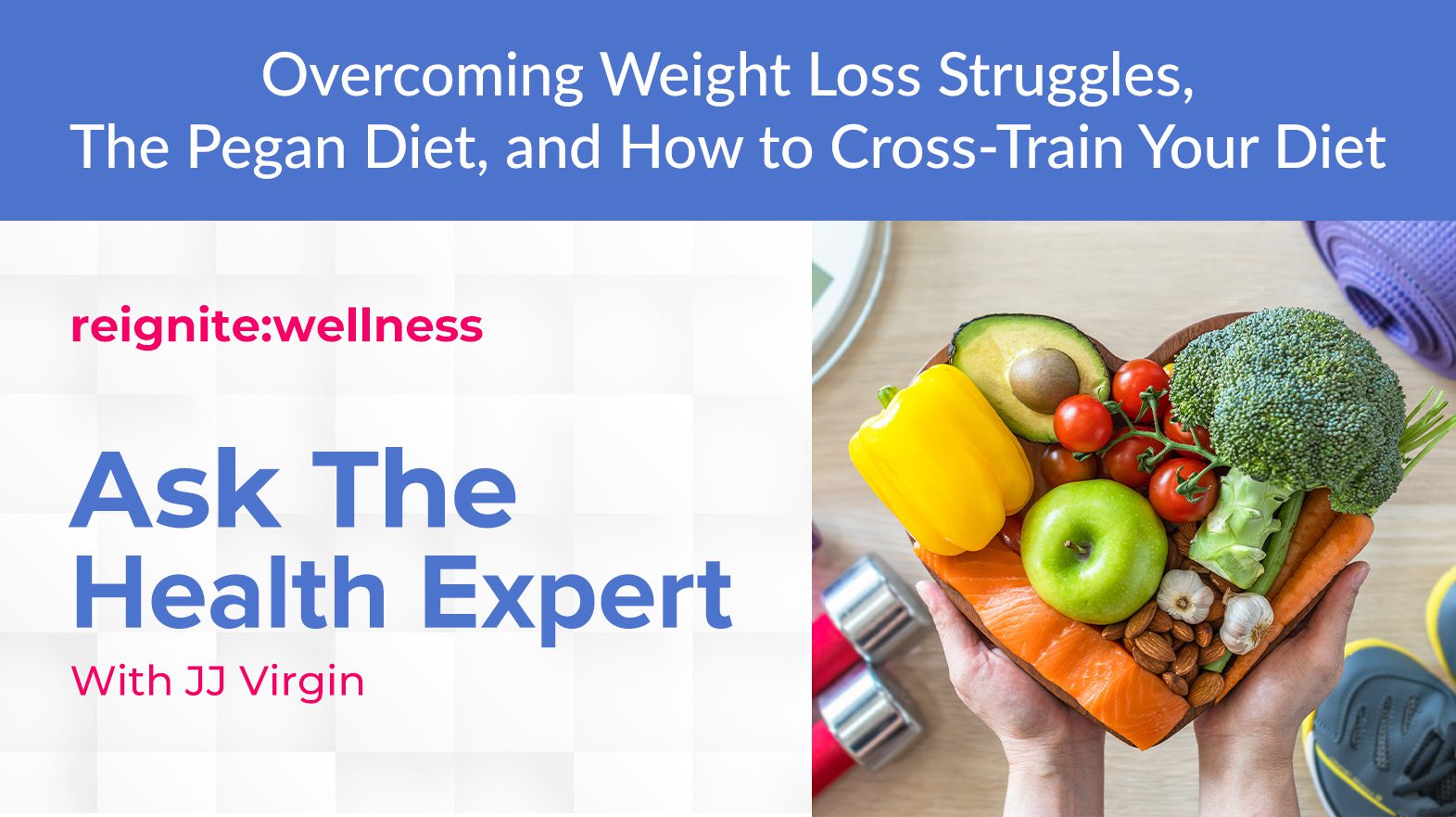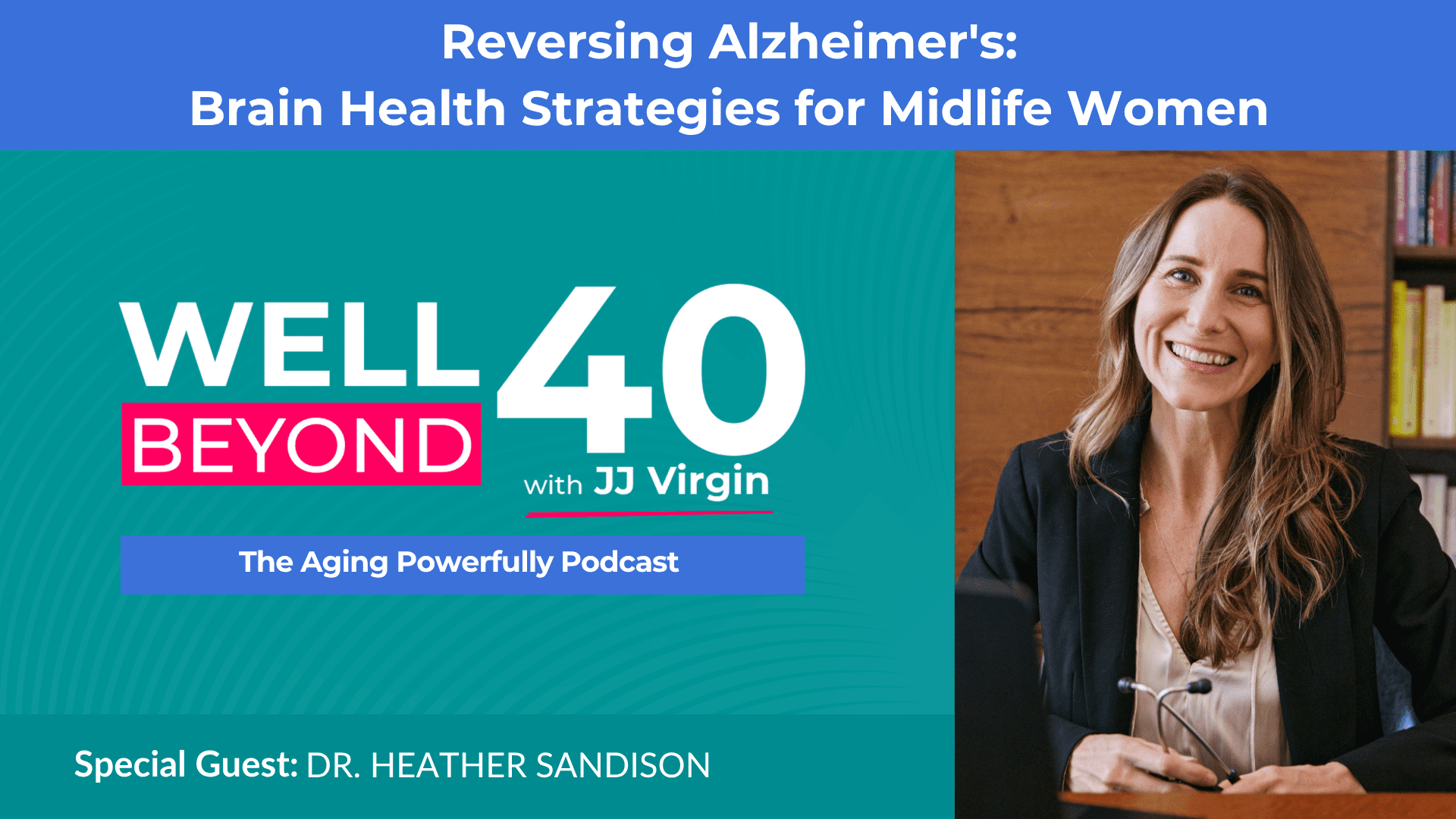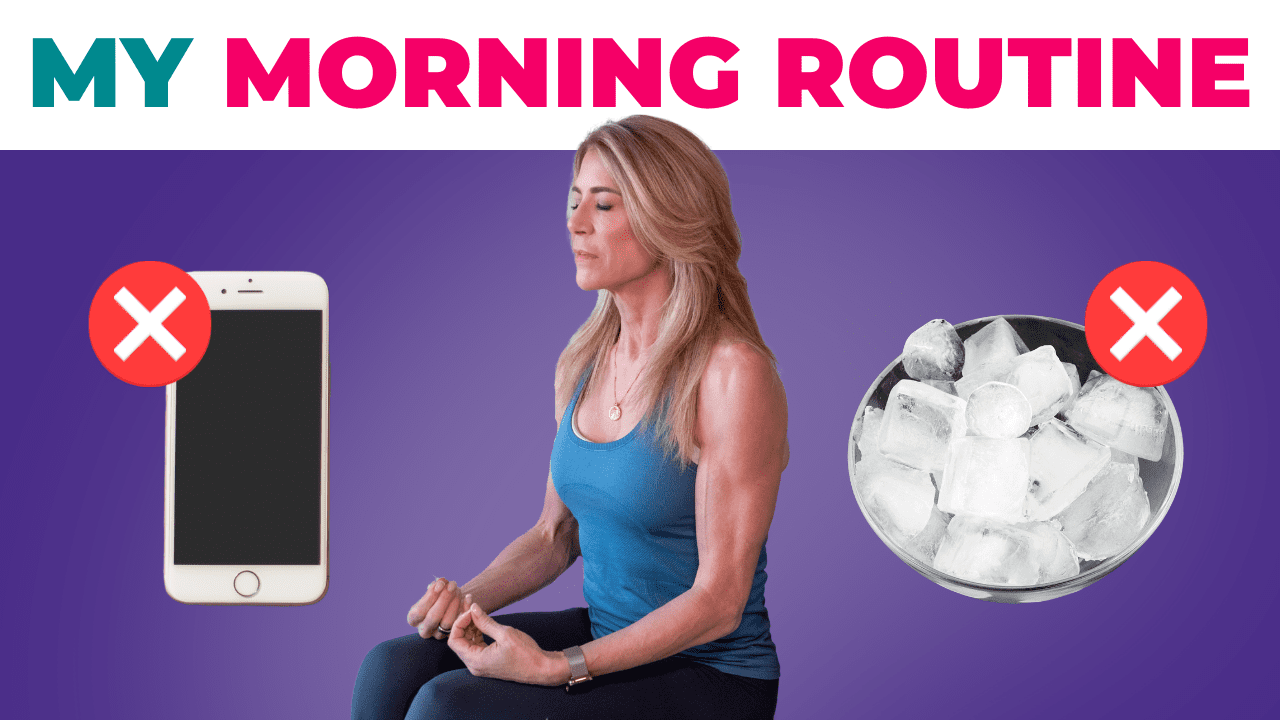3 Answers to Community Questions on Maintaining Weight Loss and Using Diets Strategically
If you struggle with weight gain, JJ recommends a new way of using the scale to better maintain your weight loss. She also talks about some of her personal struggles with weight—yes, it happens to the best of us! You’ll also hear her thoughts on Dr. Hyman’s Pegan Diet, what it means to cross-train your diet, and why you want to use different diets to achieve specific goals, such as helping support leaky gut syndrome or breaking through your sugar addiction.
Mentioned in this episode:
I Use A Body Fat Scale Every Day, But What Do All the Different Numbers Mean?
JJ’s The Virgin Diet: uncover food intolerances and heal leaky gut
JJ’s Sugar Impact Diet: breakthrough sugar cravings and figure out where the sugar sneaks in
ATHE_Transcript_Ep 513_Weekly Q&A
JJ Virgin: [00:00:00] Hey, this is JJ Virgin four time, New York Times best selling author, celebrity, nutrition expert, and fitness hall of famer. I’ve been on a lifelong quest for answers to the toughest health questions, and now I’m sharing what I found with you. Welcome to Ask the Health. Each week, I answer big questions directly from the folks in my community, and chances are there are topics you’ve been wondering about too.
If you’d like to submit a question for me to answer on a future episode, send it to jjvirgin.com/question.
Whitney from Facebook asks, I struggle with weight regain. Can you help me keep it off? Okay, Whitney, so here’s the deal. Great studies showed that people who weigh in [00:01:00] every single day tend to be better at maintaining their weight loss and maintaining their weight. I do have a caveat around that, and then I also have a little bit more information on weight regain.
So caveat number one, I want you to use the scale differently. First of all, I want you to think of a scale, not as some mean friend who’s shaming you, but as a biometric tool. But I also want you to look at that scale, and I want you to get different information from the scale. Now, the scale is giving your weight.
Ultimately, what you wanna know is what your weight’s made up of. And even more important, if you can find out. Where your fat really is. So you’re gonna use a bioimpedance body fat scale. Now, is this a hundred percent accurate? No. This gold standard really is something called a DEXA scan, but this’ll give you a good measurement that you can do on a consistent basis to see trends.
So what we wanna do is get on that scale. [00:02:00] And the bioimpedance scale is gonna tell you your total body water, which will predict your fat mass and your fat free mass. If you can get a scale that can also tell you your visceral adiposity where that fat is located, specifically, not the subcutaneous, but the deep internal fat.
Even, even better. That is super duper important. So that is one I would really look for is that Tanita makes one like that. Now what you wanna make sure of is that you’re maintaining or building fat free mass, i e your muscle as you are losing body fat or maintaining your weight. If you’re maintaining your weight, but you’re losing muscle and putting on fat.
You’re making yourself worse. Not better. It’s why we also wanna look at a waste measurement. Cuz if you’re losing weight but not losing your waist, you’re also making yourself worse, not better. Right? So that’s the first part. And again, studies are clear that people who weigh in daily and not look at your weight might fluctuate a little bit up and down each day.
If you eat something you’re intolerant to, might go up, [00:03:00] right? If you’re constipated might go up. If you are dehydrated, it could go down. So you’re looking for the trend over a week, not like every single day, but you’re weighing in every day. However, you might see your, your weight start to shift. And this is why it’s so important to step on the scale.
Cuz all of a sudden if your weight goes up and starts to climb up, you gotta go, what the heck is going on? Have I changed my diet? Have I changed my exercise? Is my thyroid function shifting? Am I going through menopause or andropause? Am I under stress? Is is my sleep getting impacted? Do I have something going on with my gut?
And that’s the other reason, to be on a scale on a regular basis is now all of a sudden you can find out quickly if something is going on with your weight. If something, cause remember, your body’s not a bank account. It’s chemistry lab. Something’s going on with that chemistry lab that you need to repair.
This actually happened to me during the pandemic. My weight jumped up five pounds immediately and I’m like, okay, well I’m stressed out. Note to self, so what can I do to [00:04:00] start helping with that? But then started going up a pound a day and I’m like, all right, come on. What really is going on? It allowed me, I went to the doctor, we did some labs, found out that I’d had an autoimmune issue that kicked up, and I was able to repair that.
Now, if I hadn’t been weighing in every day, that might have gone on for a while before I figured it out and was able to step in quickly and repair it. So that is why we want to check in with this and do something about. You know, as quickly as possible. So that is why I like to use the scale as a way to maintain your weight, but also check in and make sure everything is going well.
Use it as a biometric. Robin from Facebook asked thoughts on Dr. Hyman’s Pegan eating plan. So I remember when this whole Pegan thing came up and it was a joke and he was, he was on, I think he was on Dr. Oz and he said, oh yeah, you know, paleo vegan, I’m a Pegan. And I pinged him and I’m like, mark, you gotta write the book.
The Pegan Diet. Pegan Diet. Like I love it. Let’s have pegan and shakes and pegan pegan. And I, I think that when I really look at what could be the [00:05:00] most optimal way for us to eat, If you look at pegan it’s like vegan meets carnivore. So what the heck is pegan? What are we talking about here? It basically means eating a more paleo style
diet and when you look at paleo, it’s eating how we ate like five to 10,000 years ago. Very primal. You know, obviously you’re not eating these dirty processed foods, it’s, you’re not eating grains cuz we weren’t doing grains back then or legumes. So those are out. I kind of like a, what I call a paleo plus.
Cause I think legumes done eaten correctly, have a good place in the diet. But basically paleo is grain free, legume free. And you know what vegan is? It’s all plant-based. And so what would this be together? It’d be eating clean animal protein, clean seafood, and then putting it together with lots of, of plant-based foods.
Now, on the vegan side, you are getting grains. You are getting. You are getting beans and [00:06:00] things like that. So here’s what I, here’s where it really kind of goes. It goes more on the clean animal protein put together with lots of non searchy vegetables, nuts and seeds. More of the plant base, but not the greens and legumes.
That would be what pegan is. I’m gonna take pegan and I’m gonna go pegan plus , where I like to build your diet around clean, healthy protein first. Clean, lean protein wild. Seafood, grass fed and finished animal products by the way, you know, these factory animal products are like the white bread of animal products, so do not try to compare a McDonald’s burger to a grass fed and finished bison Burger.
They’re entirely different food sources. Then you go protein first. And then you fed and finished bison Burger. The rainbow to get the polyphenols and the fiber to really support a good microbiome. Then you add in a little bit of of fruit, especially berries, maybe little apples, get that fiber pectin and all the colors, one to two servings a day, little bit potentially of some root vegetables in [00:07:00] there.
Again, for the microbiome. And, and some healthy fats from things like nuts and seeds and wild fish and grass fed animals and avocados and olive oil. That’s it. Simple. Easy peasy there. There’s the pegan and plus that you can do dining out. You can do traveling around the world. I know cause I just did it over the last, since, I mean, literally this year I’ve been to The Bahamas, Mexico, Istanbul, the Maldives, Dubai, Peru.
Asheville, North Carolina, that’s in the side. And somewhere else that I’m forgetting. So kind of all over the place. And you can do this anywhere, I swear. So there you go. proof positive. Probably harder to do in the south than it is in a lot of the places in the world. So that’s what I love about this. It’s easy to follow, easy to do, and you’ll feel great while doing it.
So give, give pegan a shot. Travis from Instagram asks, what does it mean to cross train your diet? All right, [00:08:00] so you know what struck me the other day? I’m like, gosh, it’s so normal in fitness, you know, and I got my start in fitness 30 plus years ago as an exercise physiologist, and one of the things we know in fitness is that you should cross train your fitness routine.
Why? To avoid injury, to avoid boredom, and to continue to progress and get. . And so I was looking at that and I go, you know, we have got the whole diet thing all wrong. First of all, we need to think of diets differently and we really need two different words. We need your diet and then the way you eat every day.
And I think diet should be used short term therapeutically to achieve something like, let’s say you need to, to heal your leaky gut, or you need to break through your sugar addiction. Your sugar cravings. You know, or you want to try to get your insulin sensitivity fixed quickly and you wanna do some fasting.
So I like to use diets therapeutically. Like you know, Virgin Diet was written to help you uncover your hidden food [00:09:00] intolerances and heal your leaky gut. Sugar Impact Diet was created to help you break through of your sugar cravings, figure out where sugar sneaks in, and really figure out how many carbohydrates do you feel best with in your diet.
And so it struck me that, gosh, you know, if you cross-train your diet and cross-train, your diet would mean this. You use diet short-term, like figuring out your food and tolerances, lowering your sugar impact. But then you also are doing, you know, carb cycling, caloric cycling. And intermittent fasting so that you’re varying your calories and maybe you’re, you are manipulating your carbs or fat based on what you’re trying to accomplish.
So here’s, I’ll give you an example. Let’s say that you are really working on putting muscle on right now. Well, if you’re working on putting muscle on, you’re, you’re really, that is gonna be your focus, not losing. Okay, it’s putting on muscle. After you do that, you can start to look at dropping some body fat.
So during that time you’re working on putting on muscle, you’re gonna be upping [00:10:00] your protein a little bit, maybe upping your carbs a little bit too, so you have more energy during your workout and really cycling that in so that you’re really supporting your workouts and eating more. During those days that you are working out heavy, then you decide, Hey, I want to drop a little body fat.
And hold on to my muscle and I’d like to get a little more, you know, blood sugar stable. And then maybe during that time you are cycling your carbohydrates. So you’re not doing as much on the days, you’re not working out hard and you’re adding in some intermittent fasting. Cause now you’re not as concerned about getting protein in three times a day.
So maybe you’re doing. Like every other day, eating for a little bit to trigger autophagy and really help your body take out the cellular trash. You know, or maybe you’re focusing on a detox for a couple weeks where you’re working on getting some of the things that have crept into your diet out or really focusing on an advanced detox to or supporting.
And that’s what I look at by [00:11:00] cross-training your diet, you have your basic eating plan. You know which foods work best for you, which foods don’t. Again, that’s the virgin diet. You’ve lowered your sugar impact. You’ve figured out where sugar’s sneaking in. You’ve gotten that out and you’ve gotten your taste buds to appreciate natural sweetness, not adulterated sweetness.
That’s the sugar impact diet, and you’ve really nailed the plate, the protein, fat and fiber trifecta for satiety and blood sugar bounce. And then you’re just playing around and manipulating things based on. Goals are what you want to do. Maybe adding in some time restricted feeding, you know, adding in some detox, that kind of thing.
That is cross-training your diet just like you would cross-train your exercise, give it a shot, and it really allows you to mess around with things. Remember, when you’re doing a diet, you’re really looking for what’s working here for me that I’m gonna bring into my everyday eating plan. Cuz it may be that it doesn’t work at all, and that’s okay too.
You didn’t fail, you got information. All right. Thank you so much for that question.
This is JJ with [00:12:00] Ask the Health Expert. I answer your questions weekly. Plus I interview the top experts in health and wellness, so make sure you never miss a show by going to subscribetojj.com. Yep. It’s that. I’ll see you next time.

 Subscribe to our show
Subscribe to our show 




